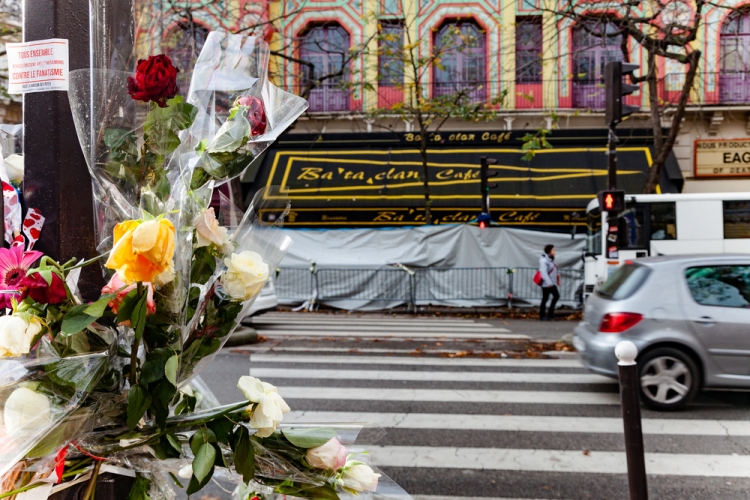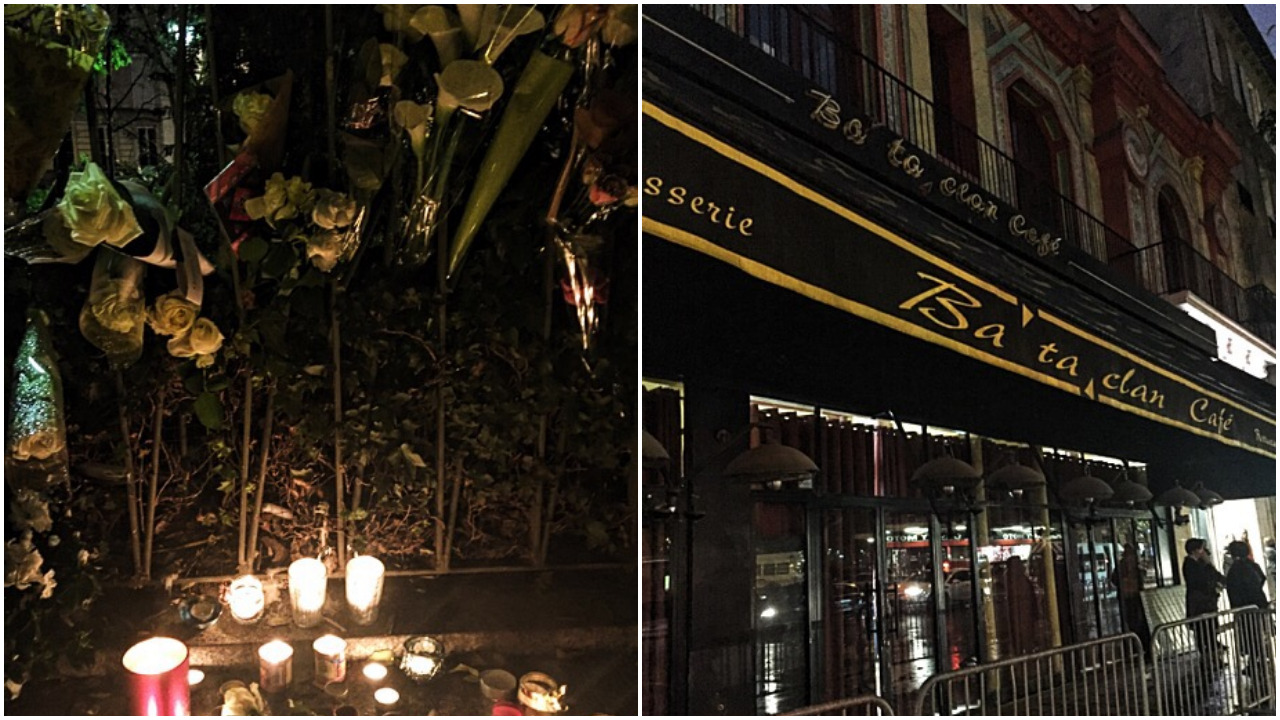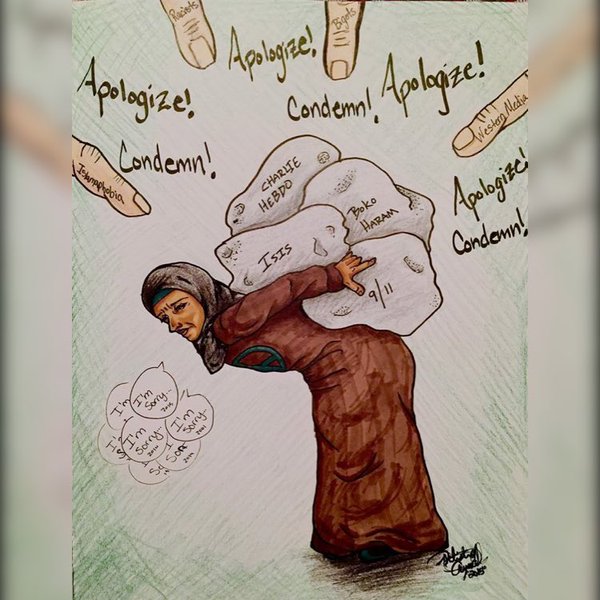A Year Later: Parisians Moving Forward After Terrorist Attacks

In France 11/13 is the equivalent of 9/11 for Americans — a date synonymous with unspeakable horror. It is forever etched in France's collective consciousness.
November 13 marked the first anniversary of the terror attacks that claimed the lives of 130 people throughout Paris — at the Stade de France, at the Bataclan concert hall, and on café terraces and restaurants in one of city's trendy 11th arrondissement. A year on from the slaughter, 20 of the 400 who were injured are still recovering in hospital. Witnesses and survivors of the attacks are still receiving treatment for trauma.
The Bataclan attack was the longest and bloodiest, beginning at 9:40 pm and ending after midnight. The legendary rock venue remained closed after the massacre. Now it has reopened, kicking off its rebirth with a special charity concert by Sting.
Stepping on stage to loud cheers, Sting delivered a message in French to the crowd: "We've got two important things to do tonight....First, to remember and honor those who lost their lives in the attacks a year ago, and to celebrate the life and music of this historic venue. So before we begin, I would like to ask that we observe one minute of silence....We shall not forget them."
Many in the crowd wept during the first song, "Fragile." Present in the audience were those who survived the attacks, as well as friends and relatives of those who did not.
Image Credit: Tara Jamali
President Francois Hollande and Paris mayor Anne Hidalgo unveiled commemorative plaques the following morning in front of the Bataclan and the Stade de France. That evening, hundreds of paper lanterns were set afloat along the city's Canal Saint-Martin as crowds looked on silence. The lanterns were lit with red, white, and blue lights representing the French flag. Several hundred balloons were released from the town hall. A special mass was held at the Notre Dame cathedral to mark the anniversary of the attacks and honor the victims. Hundreds gathered at the Place de la République, a main rallying point in Paris, lighting candles and piling flowers at the foot of the Marianne, the bronze statue personifying the French Republic.
The attacks prompted the French government to declare a state of emergency across the nation. Security protocols intensified. Bag checks upon entering public buildings became a routine part of life. Police and military presence increased. The state of emergency was extended following the attacks in Nice on Bastille day, in which an ISIS supporter used a truck to kill 84 people. According to Prime Minister Manuel Valls, the state of emergency will likely continue until the presidential elections in May.
"It is difficult today to end the state of emergency," said Valls. "Especially since we are going to begin a presidential campaign with meetings, with public gatherings. So we must also protect our democracy."
Last weekend, thousands of French and Europeans visited the upper Marais neighborhood in the 11th arrondissement where the Bataclan is located. Flowers were laid and candles were lit in makeshift memorial sites around the concert hall. Some were still in shock over the attacks. It was not uncommon to witness a shed tear or two.
"As a citizen I must be here, it is very important for me," said Genovard Damien, who traveled to Paris from Tours to pay his respects. "I don't know how to explain, it is very terrible. I have no words. My heart is in pain. Nobody I knew was killed but it feels the same for me. Terrible thing, very terrible thing, too many people killed. I still don't understand why they did that to us."
A plaque commemorating victims of the Bataclan attacks. Image Credit: Tara Jamali
"It's important that life goes on after such a traumatic event," said Benjamin Cohen, a director of broadcast productions at the Bataclan. "I'm very happy that we can bring this place back to life again." He remembers working at the concert hall only a week before the attacks, shooting with the same crew and directors who were present on the night of the attacks, and is grateful they all happen to be alive. The attacks have not changed his perception of Muslims. "I have Muslim friends I've known for many years, and for me it's all the same."
It was not all the same for Jesse Hughes, frontman of the metal group Eagles of Death, who had been playing the Bataclan on the night of the attack. Hughes was turned away from the Sting concert at the Bataclan's reopening, for having suggested Muslim security guards at the Bataclan were complicit with the terrorists. Hughes, a Donald Trump supporter and NRA member, called for more lenient firearm laws in Europe after the attacks.
In the wake of the attacks, messages from grieving friends and family, and tales of survivors went viral. Antoine Leiris received public attention after posting an emotional open letter on Facebook after his wife and mother of their infant son was murdered in the attacks. In his post, "Vous n'aurez pas ma haine," which translates to "you will not have my hate," he wrote to his wife's murderers that he will never give them the satisfaction of having his anger and hatred. Excerpts of the post, translated into English, are as follows:
"Friday evening you stole the life of an exceptional person, the love of my life, the mother of my son, but you will not have my hatred. No, I won't give you the gift of hating you. Of course I'm devastated by grief, I admit this, but it will be of short duration. I know she will accompany us every day and that we will find ourselves in the paradise of souls, free, which you will never have access to. Us two, my son and I, are stronger than all the armies in the world. I don't have any more time to devote to you, as I must go back to my son who has just woken up from his nap. He's only 17 months old, he is going to eat his snack just like every other day, then we will play like every other day. All his life this little boy will be happy and free. Because you will never have his hatred either." You Will Not Have My Hate is now a memoir by Antione Leiris, published by Penguin Press.
The attacks have triggered racist attitudes across the nation, with distrust and discrimination directed toward Muslims. The Collectif Contre l'Islamophobie en France (Collective Against Islamophobia in France) received reports of vandalized mosques and restaurants owned by Muslims since the attacks. In Britain, 115 hate crimes were reported in the week following the attacks. Female Muslims wearing the hijab became especially vulnerable to Islamophobic incidents. Yaser Louati of the CCIF released a series of statements to his fellow French citizens after the attacks to help them distinguish between religion and violent extremism. Muslims around the world took to social media to show solidarity for those affected by the Paris attacks, creating campaigns such as #notinmyname to demonstrate that ISIS and Islam were not on the same page, and that they condemned the terrorism committed in the name of Islam.
Image Credit: Philistine Ayad
A year on, many in France are still mourning the November 13 attacks. While emotions were intense among those paying their respects at the reopening of the Bataclan, a deep sense of humanity was able to override fear and anger. During the year of its closure, the destiny of the legendary concert hall seems up in the air, but Bataclan head Jerome Langlet said that keeping it closed was never in the cards.
"We will never forget the victims, we will continue to grieve," he told the Financial Times. "We spoke at enormous lengths with the victims' families, survivors, associations, our teams and the authorities, and decided that reopening is the best thing to do."
Marie, a local Parisian present at the Bataclan's reopening, believes it is imperative for the French to move forward as a community, regardless of race or religion.
"What is important is to stay together and united," she said, kneeling to light a candle at one of the memorial sites. "We will continue to live and go to cafes and live in fraternity together. We will continue living the way we should."









